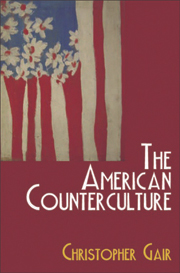5 - Fiction
from Part Two - 1961–1972
Published online by Cambridge University Press: 05 August 2013
Summary
Maybe the target nowadays is not to discover what we are, but to refuse what we are.
Michel Foucault, ‘The Subject and Power’ (1982)‘Close the book, man, what's the matter with you, don't you know you're liberated?’
Unnamed student protestor in E. L. Doctorow, The Book of Daniel (1971)There are both ruptures and continuities between the Beat Generation and the countercultural fiction of the 1960s. Jack Kerouac – whose On the Road is unquestionably the iconic Beat novel – seemed both to him and to many others to belong in another America. On the one hand, On the Road celebrates the kind of individualism increasingly challenged by the more collective ideals of the ‘60s; on the other, the explosion of anti-Establishment movements that rejected his largely conservative views about the United States appalled Kerouac. At heart, he remained the small-town Catholic child of French Canadian joual-speaking parents, eulogising such staples of national life as baseball and apple pie and ice cream, and becoming ever more angry at what he saw as the hippies’ crass betrayal of the Beat ideals of ‘conviction’ and ‘spirituality’. In any case, he was a reluctant prophet, withdrawing into alcoholism and life with his mother and his third wife, Stella, the sister of a childhood friend.
- Type
- Chapter
- Information
- The American Counterculture , pp. 139 - 160Publisher: Edinburgh University PressPrint publication year: 2007

